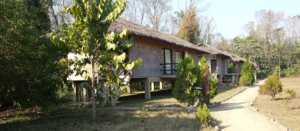Amaltari ( Nawalparasi) : Travel trade entrepreneurs have urged the government to introduce guidelines for using elephants in the jungle safaris , so that wildlife tourism could be protected in the country.
International animal rights groups have called on the governments and international organizations around the globe requesting a ban on elephant rides.
The groups, expressing their concern for the plight of elephants, have requested all the stakeholders to prevent cruelty to these intelligent and social animals.
Chitwan National Park, established in the subtropical southern part in 1973, is rich in species of mammals, birds, fish, flora and fauna. CNP is renowned for its protection of One Horned Rhinoceros, Royal Bengal Tiger and Gharial Crocodile.
There are 125 tigers, 605 rhinos and 140 elephants inside the park and buffer zone. The number of captive elephants is estimated to be around 250 in the country, including the elephants used by the government for patrolling the national parks.
An elephant costs up to Rs 8 million and expenditure per month is between Rs 50 000 – 60,000 for food and medical care of an elephant.
Chitwan National Park is one of the most preferential tourist destinations in Nepal.
According to Basanta Raj Mishra, Executive Chairman of the Temple Tiger Group of Companies, Nepal is pioneer in jungle safari in Asia and regarded as ‘Africa of Asia’.
Temple Tiger has been at the forefront of nature and wildlife tourism for more than three decades. It operates Green Jungle Resort in the buffer zone area of Amaltari Ghat of Nawalparasi district.
“We are very much aware of international campaign against animal cruelty and committed to responsible and sustainable tourism. Wildlife tourism, hotels and resorts operating in the buffer zones of national park have been protecting the animals including giant elephants. The elephants are highly respected and accredited to helping save national parks and wildlife there. We have not abused the elephants, nor we have used them in circus entertaining the people. The elephants are used only for protection of national park and tourism purposes. We are very much sensitive to their food , medical care and habitat . There would be no importance of national park without elephant safari in Chitwan,” he said.
The hotels and resorts have invested billions of Rupees to operate safaris in the buffer zones of the national park during the last five decades.
Hundreds of local people are benefited in the area due to activities of jungle safaris and income generating programs.
A large number of homestays are developed in Amaltari and other buffer zone areas as thousands of domestic tourists are attracted to elephant safaris every year.
Mahout Mahendra , involved in the elephant safari since the last 35 years , said they regard the elephants as God and care for their food and good health .
Jungle safari operators in Chitwan and Nawalparasi have requested the government and concerned bodies to set the necessary guidelines for safety of the elephants and protection of wildlife tourism, rather than controlling the activities of elephant-back safaris.
“We respect the concerns of international activists, but request the government and all the concerned agencies to find the solution for protection and development of wildlife tourism in the country. We can introduce a balanced guideline for elephant-back safaris and urge the government to take initiatives for protection of wildlife tourism for overall development of national tourism industry ,” Mishra added.
Travel trade entrepreneurs have requested the government to find solutions to promote responsible and friendly elephant safaris keeping in view the international campaign.
‘This initiative will protect wildlife tourism and contribute in attracting 2 million tourists in the coming years.’


